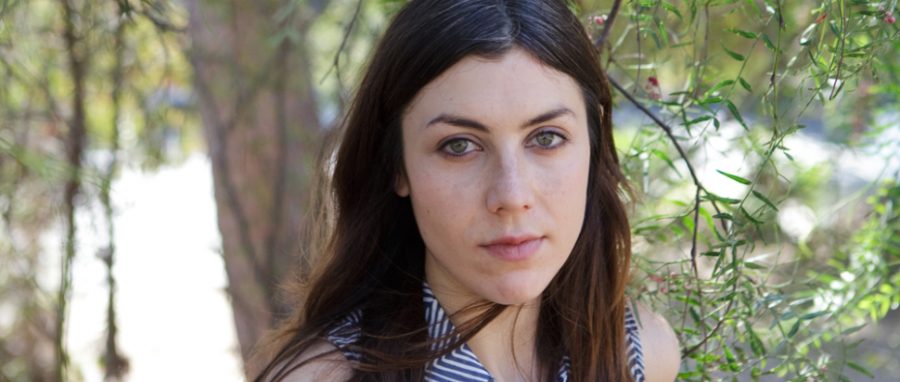@ Summerhall, Edinburgh, on Sat 20 Feb 2016
Summerhall’s Nothing Ever Happens Here strand of music events is an eclectic presentation of artists from most every genre around the world. Tonight’s features Julia Holter, west coast USA performer whose four albums have brought comparisons to Kate Bush and Laurie Anderson.
As the Dissection Room fills, the crowd ignores the young man fiddling with mics and guitar onstage until he starts singing. This is support act D.M. Stith, though it is some time before he introduces himself. Coming across as an introverted bedroom performer, New Yorker Stith quickly proves himself to be a mesmerising and mature lyricist with exceptional vocal control, sounding at times like a young Peter Gabriel. Paying welcome homage to the laid-back style of Simon & Garfunkel and vocal techniques of modern country singers, through atmospheric looping and layering, this poetic performer is a perfect soundtrack to a Sunday morning with good coffee, fresh cotton and soft skin.
Julia Holter is touring with Dina Maccabee (viola and vocals), Devin Hoff (bass) and Corey Fogel (drums and vocals) and this line-up provides an ethereal jazz crossover, steered brilliantly by Holter’s keyboard and lead vocals.
Holter’s ten song and two encore set is the perfect example of post-(post)-modern music making. Within her incredibly versatile vocals are traces of Joni Mitchell, Siouxsie Sioux, Andersons Jon and Laurie, Alanis Morissette and Judy Tzuke. The songs feel smattered with influences of early Eurythmics, Ultravox, Penguin Cafe Orchestra, John Martyn, Nick Drake, Pink Floyd, eastern European klezma mixed with north African chaabi, west coast USA, more than a touch of Frank Zappa and even psychedelic-era Beatles complete with kicking 60s harpsichord. Yet at no point does Holter plagiarise or sound like a confused mish-mash; she drives her creativity and incredible voice through an exploration of the history of the best of popular music.
If there is any criticism of this gig it is purely that, as a non-dancey (though plenty of noddies) set from both performers, a seated evening would have been preferable, since the space does not lend itself well to moving easily between the audience area and the bar/toilets area. All this is made more difficult as the crowd jams together for a better view of the low stage. Even Holter thanks the audience for standing so long.
Holter does it her way, creating entirely new and utterly fresh and surprising pieces. From the gorgeous, airy City Appearing, through the tinkling meditation of Lucette Stranded on the Island, to the simply perfect pathos of Bacharach and David’s Don’t Make Me Over. Julia Holter’s versatility is the musical equivalent of Haruki Murakami’s novels: diverse, fluid and utterly compelling.
